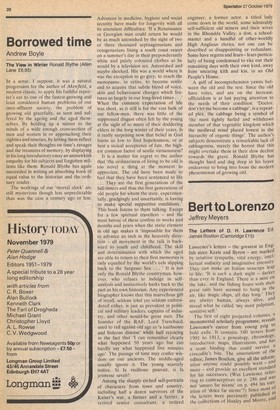Borrowed time
Andrew Boyle
The View in Winter Ronald Blythe (Allen Lane £6.95) In a sense, I suppose, it was a natural progression for the author of Akenfield, a modern classic, to apply his faithful reporter's ear to one of the fastest-growing and least considered human problems of our once-affluent society, the problem of growing old gracefully, as seen and suffered by the ageing and the aged themselves. By holding up a mirror to the minds of a wide enough cross-section of men and women in or approaching their eighties and nineties, by letting them reflect and speak their thoughts on time's ravages and the treasures of memory, by displaying in his long introductory essay an unmawkish empathy for his subjects and forgotten millions like them. Ronald Blythe has again succeeded in writing an absorbing book of equal value to the historian and the ordinary reader.
The workings of our 'mortal clock' are still mysterious though less unpredictable than was the case a century ago or less. Advances in medicine, hygiene and social security have made for longevity with all its attendant difficulties: 'If a Renaissance or Georgian man could return he would be as much astonished by the sight of two or three thousand septuagenarians and octogenarians lining a south coast resort on a summer's day in their preponderantly white and palely coloured clothes as he would by a television set. Astonished and maybe shocked. His was a world where it was the exception to go grey, to reach the menopause, to retire, to become senile and to acquire that subtle blend of voice, skin and behavioural changes which features so largely in our long-lived times ...' When the common expectation of life was short, as it still is for the vast bulk of our fellow-men, there was little of the suppressed disgust often felt by the young at the sight of so many of their doddering elders in the long winter of their years. Is it really surprising now that belief in God burns so low to find hopelessness, or at best a stoical acceptance of fate, the highest common factor of senile virtuousness?
It is a matter for regret to the author that 'the ordinariness of living to be old is too novel a thing at the moment to appreciate. The old have been made to feel that they have been sentenced to life ... They are the first generations of the full-timers and thus the first generations of old people for whom the state, experimentally, grudgingly and uncertainly, is having to make special supportive conditions This book listens to them talking. Except for a few spiritual travellers — and the most heroic of these confess to weeks and months and years when the static element in old age makes it 'impossible for them to advance an inch in the heavenly direction — all movement in the talk is backward to youth and childhood. The skill and determination with which the aged are able to return to their first memories is only equalled by the world's eels slipping back to the Sargasso Sea ... ' It is not only the Ronald Blythe countryman, however, who refuses to indulge in selfanalysis and instinctively harks back to the past as his own historian. Any experienced biographer knows that this marvellous gift of recall, seldom total yet seldom embroidered either, is just as prevalent in political and military leaders, captains of industry. and other would-be great men. The founder of the RAF, Lord Trenchard, used to rail against old age as 'a loathsome and hideous disease' while half rejoicing in the fact that 'I can remember clearly what happened SO years ago but can hardly say what happened five minutes ago'. The passage of time may confer wisdom on our ancients. The middle-aged usually ignore it. The young scarcely notice. Si la vieillesse pouvait, Si la jeunesse savait!
Among the sharply etched self-portraits of characters from town and country, including half a dozen survivors of the Kaiser's war, a farmer and a farrier, a retired senior consultant, a retired engineer, a former actor, a titled lady come down in the world, some admirably self-sufficient old miners and their wives in the Rhondda Valley, a don, a schoolmaster and a handful of other-worldly High Anglican clerics, not one can be described as disappointing or redundant. Some have regrets and fears— fears particularly of being condemned to eke out their remaining days with their own kind, away from uncaring kith and kin, in an Old People's Home.
A gulf of incomprehension yawns between the old and the rest. Since the old have votes, and are on the increase, officialdom is at last paying attention to the needs of their condition. 'Doctor, don't let me become a cabbage', is a repeated plea, the cabbage being a symbol of 'the most tightly furled and withdrawn member of that vegetable kingdom which the medieval mind placed lowest in the hierarchy of organic things'. The author's subjects demonstrate a remarkable lack of cabbageness, merely the horror that this might overtake them in their slow decline towards the grave. Ronald Blythe has thought hard and dug deep in his brave endeavour to bring into focus the modern phenomenon of growing old.


































 Previous page
Previous page